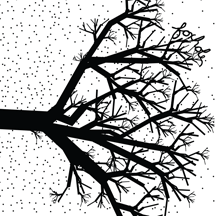| For
the better part of a decade, Kentucky’s Foxhole has sought
to create music that speaks from—and to, and of—the
soul. And nowhere is that pursuit so potent as on their debut full-length
album We the Wintering Tree.
Beginning with the blooms and fades of “A Series of Springs
and Falls,” into the
relentless, back-and-forth rock of “The End of Dying,”
and capped by the somber
reflections of “Through Bone and Marrow,” the ten songs
on We the Wintering Tree take listeners through the life, death
and cyclical rebirth of nature. The imagery is echoed through the
white snow and sleeping tree of the letterpressed album artwork.
We the Wintering Tree is an overwhelming look at life and death,
of mortality and transcendence—or, to quote the band’s
liner notes, “The sign of a promise of a new and better life.”
From start to finish, We the Wintering Tree is a sober (if not altogether
somber) reflection on the unclassifiable emotion, as well as the
tenuous hopes and relentless fears of humanity.
Recorded across two weeks of near-constant activity in the sanctuary
of a small-town
Kentucky one-room church. “We wanted something big, something
that made the drums
sound massive, but we wanted to do it without artificial effects.
Everything was recorded with two ambient condenser mics out in the
pews, along with direct mics on amps, so that we'd have stereo room
sound wherever we wanted it. I’ve always loved one-room country
churches — there’s something about the high ceilings
and simplicity of the architecture that makes anything you put in
there sound rich, and I think that natural effect lends an honesty
to the songs.” says Foxhole’s Greg Leppert, who also
engineered the album.
Foxhole’s sound has generally been classified instrumental
“post-rock.” The interplay of
guitars, bass, and trumpet atop a barrage of deft percussion has
brought comparisons to
instrumental bands such as Explosions in the Sky, Mogwai, and Do
Make Say Think, though the offering on We the Wintering Tree is
much more diverse than those comparisons might indicate. It is the
beautiful trumpet backbone that sets them apart from others in the
post rock genre, the horn tones filling the melodic space of a guitar
amp or the voice of an absent singer.
Most of the band grew up around Louisville, and that ‘90s
indie rock scene profoundly affected the group’s approach
to music. Shades of Slint, Rodan, Rachel’s, and Papa M lightly
color We the Wintering Tree, though a decidedly more optimistic
note rings through. Contrasted against those seminal bands, Foxhole’s
composition comes across as more traditional; yet the band’s
overall approach on We the Wintering Tree was more dynamic, and
arguably more articulate. Through major shifts in tone and emotion,
Foxhole holds constant to what might be called post-humanism —
looking in while ringing out.
Formed
in and still centered around Bowling Green, Kentucky, Foxhole released
their late 2006 Push/Pull ep on Philadelphia’s Burnt Toast
Vinyl. Despite its brevity (five songs in about 30 minutes), it
was selected as No. 7 on The Silent Ballet’s Top 50 Instrumental
Albums of 2006 list (one spot above Mogwai, in fact).
“Foxhole
is the anti-Explosions in the Sky, in the sense that it succeeds
in remaining
exciting… This is a particularly hard album to define because
inside its extreme coherence one feels much more broad musical influences
and an extreme ease and self-confidence of it… With Foxhole,
one finds feelings which one has not had in ten years, from the
time when the genre was young and free and where each group was
able to bring its own vision… The heart of the musical myth
that is Louisville
starts to beat again.” --Translated from the French zine Derives,
www.derives.net
“As one of [the] most overlooked albums, ‘We the Wintering
Tree’ is a testament to Foxhole's talent and artistic creativity.
The album moves with varying force, changing forms slightly from
song to song in order to creative a diverse arrangement of compositions
and sounds.”--DecoyMusic.com
|
